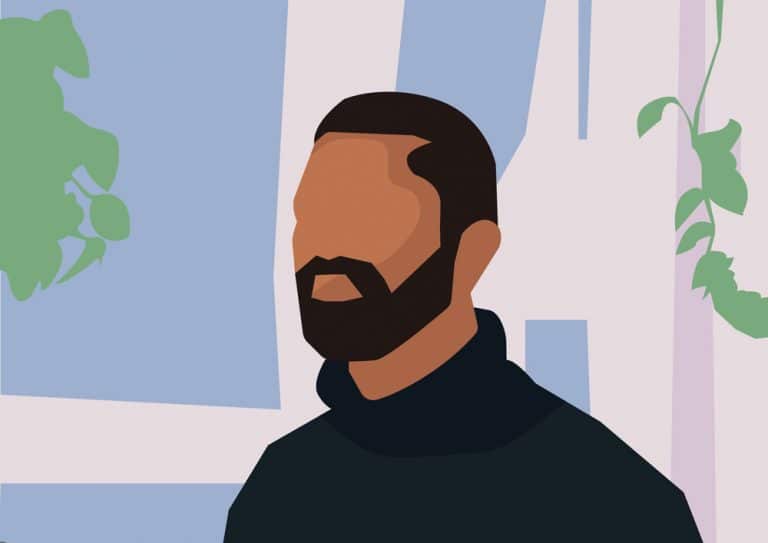New gen bosses: Sabba Keynejad on how he built VEED for the users, not accolades

New gen bosses is a new series created to guide and inspire more people to go out there on their own, either as new business founders or freelancers. And what better way to do that than to ask the ones that already succeed at it? We want to know about big fuck-ups and even bigger successes, and the risky decisions they had to make along the way. We want to be the last little push you needed.
Job title: Co-founder & CEO
Industry: Media and Tech
Company founder or freelancer: Founder
Company name: VEED
How long have you been doing it: 1 year and a half
Age: 28
Location: London
What pushed you to start on your own?
Many years before I started VEED, I had always known that I wanted to start my own company and for some reason, I always found more creative energy and passion working on personal projects than I had when working for clients and agencies. I was that annoying guy who always had a new side project on the go every other month. I soon realised that to do my best work, I had to work for myself.
As a creative with a background in design, I spent a few years working in agencies as a freelance designer after I graduated from university. It was during these years that I learnt a lot about how creative agencies worked. I had previously thought there was nothing cooler than running your own agency, at the time that was the dream.
However, I soon learnt that agencies can be extremely competitive and unreliable businesses to run. But it was also during this time that I saw a growing need for short-form video content, yet there were little tools available to this in a timely and efficient manner.
This was the thread of an idea that led me to stop working at agencies and start up my own company.
What was the very first thing you needed to do to set everything up?
We have made a lot of textbook mistakes building VEED. The very first thing I did is different from the first thing I should have done.
The first thing Tim and I did was to save up money to give us enough runway to build the initial product. Once we had about 6 months runway, we started building the app that we thought the market wanted. This ended up being a huge mistake as the first iteration of the product ended up not being useful to anyone.
The first thing we should have done was to buy a domain and start blogging about the idea, sharing designs, feature ideas and collecting potential users’ emails. Then we should have spoken with those potential users to understand what were their biggest pain points where. You can find out more about how we messed up multiple times in a blog post we wrote called ‘the journey to ramen profitability’ where we outlined the major steps we took to start making good revenue from the product.
What was the riskiest decision you had to take?
Summer 2018 was a hard period for us. We only had a few users, no revenue and had pretty much run out of money. The two developers we hired both quit on the same day, a week later we got kicked out of our office, finally a week after that we had pretty much nothing left in the bank.
We thought it was game over.
We tried and had failed.
As you can imagine, it was depressing.
Tim and I both took contact jobs and then hired two amazing new developers to keep the product moving forward (who are still working with us today). This was not an easy decision at the time to make. From an outsider’s point of view, it would appear that we were throwing good money after bad. Most people said we should quit already.
Over the space of 5 months, we poured a significant percentage of our salary (again) and time to keep growing the product. Fortunately, it worked out and we started seeing good growth. At the time, it did not feel risky, but looking back on it I think it was.
What was a skill you didn’t foresee needing that you had to learn?
Writing, period.
I have always found writing extremely hard. I failed GCSE English 3 times, and once I finally passed, I went to art school and thought I would get away with just designing things all my life. This turned out not to be true and I worked on improving my reading and writing ability.
I now spend most of my time writing content, emails, interviews, tweets, scripts, customer service requests, proposals, blog posts, updates. It’s all writing!

At what moment did you realise that this was going to work out?
Our business is a SAAS ‘Software As A Service’. This means we have users paying us on a monthly recurring basis. As long as we keep building a great product that our users love, we will start feeling the benefits compounding per-user subscriptions.
In October 2019, 4 months after we started charging, we hit an important milestone. We ran out of our funds at the same time the company’s revenue passed the threshold we needed to pay everyone a salary. Since then, we have continued to grow 40 to 50 per cent month over month. This has been a huge win for us!
What did you spend your money on?
Sadly, we don’t have huge payout days like when an agency wins a contract, it’s more like many little wins that add up. For example, when we crossed 100K in annual recurring revenue, we went out for a few beers, nothing crazy. The majority of our profits are reinvested into the product and team to continue to grow. We do plan on sponsoring and getting involved in more events as we continue to grow.
What was your biggest fuck up?
We have had so many colossal fuckups that it’s hard to pick one. But the one that stands out is when we decided to try and win money at pitch competitions instead of winning over our users.
Let me explain…
In any major city, there are many startup pitch competitions with cash prizes. We thought that we could win extra money by entering competitions, so we did. The good part is that we almost won every competition we entered. However, during this process, our startup idea started changing to win over the competition judged. We were fooling ourselves that we were making progress and building a company, but we were just picking up vanity metrics.
During those 6 months, we won thousands in grant funding, we were balling and everything was going amazing (so we thought). We hired developers and built this award-winning product.
When we finished the product and tried to sell it, no one was interested. This is when we realised what a big mistake the last 6 months have been. We should have avoided all competitions and just focus on building a product that met our users’ needs, not competition judges.
What was your biggest success?
When we started building our simple online video editing, we only had feel tools such as the ability to crop your video, trim, filter, add text, add images and also add music. These tools were great, but not going to change the world.
It was only when we added our subtitle video feature that our users started getting excited about the product. So we set ourselves a goal to become the best subtitle tool online last year. We added our auto subtitle and packed in loads of great features and tools and things started taking off. We have moved on since then to add many more popular features such as progress bars, music visualisations, and also a podcast to video tool and video effects.

What do you know now that you didn’t know then?
There are so many lessons I have learnt along the way. I think when starting a company, you need to unlearn everything you previously thought was true and start again.
I feel that in education and the workplace we are encouraged to present and share our best work only when it is finished. This way of thinking stops you from getting critical feedback, insights and stunts momentum.
I used to think I needed to make my work perfect before I would share it with the world. I would lock myself in a room and work for months on end until I was happy with it. The reality is that I was setting myself up to fail and would end up never finishing the project I was working on.
Now I think more along the lines of “What is the minimum I can do ?” before I show a feature or share my work.
What are three tips you would give someone who wants to start on their own?
One: Launch, post, make and share regularly.
Two: Don’t set the bar too high, or you will fail. Instead, set realistic goals.
Three: There is never a good time to start, so just do it now.
Want to discuss taking the leap with other new gens? You’re in luck! We’ve created New Gen Bosses, a Facebook group to continue and expand the conversation started through this new series.




